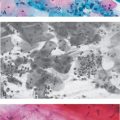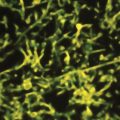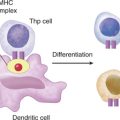CASE 51
KL is a 20-year-old first-year medical student who is visiting you for the fifth time in 4 months, with evidence of a viral-type respiratory infection. He has previously been a healthy individual, has all his vaccinations up to date, and has not traveled out of the country. He admits to finding his course study load “tiring and difficult” and has had to stay up at night on at least one occasion each week over the last month to prepare for tests. His roommate is well. His weight is stable. He is currently afebrile, with a dry cough. You order routine blood work and a chest radiograph, with all results returning as normal. What is the potential pathophysiology of this problem? What might you do about it?
QUESTIONS FOR GROUP DISCUSSION
RECOMMENDED APPROACH
EFFECT OF STRESS ON IMMUNE RESPONSES
Ader R, Cohen N. Behaviorally conditioned immunosuppression. Psychosom Med. 1975;37:333.
Bartels M, et al. Heritability of cortisol levels: Review and simultaneous analysis of twin studies. Psychoneuroimmunology. 2003;28:121.
Beishuizen A, Thijs LG. Endotoxin and the hypothalamo-pituitary-adrenal (HPA) axis. J Endotoxin Res. 2003;9:3.
Caspi A, et al. Influence of life stress on depression: Moderation by a polymorphism in the 5-HT gene. Science. 2003;310:291.
Clement Y, Catatayud F, Beizung C. Genetic basis of anxiety-like behaviour: A critical review. Brain Res Bull. 2002;57:57.
Davis CJ, Harding JW, Wright JW. REM sleep deprivation-induced deficits in the latency-to-peak induction and maintenance of long-term potentiation within the CA1 region of the hippocampus. Brain Res. 2003;973:293.
Dhabhar FS, McEwen BS. Enhancing versus suppressive effects of stress hormones on skin immune function. Proc Natl Acad Sci USA. 1999;96:1059.
Flint J. The genetic basis of neuroticism. Neurosci Biobehav Rev. 2004;28:307.
Hairston IS, et al. Sleep deprivation elevates plasma corticosterone levels in neonatal rats. Neurosci Lett. 2001;315:29.
Irie M, Nagata S, Endo Y. Effect of isolation on classical conditioned histamine release in guinea pigs. Neurosci Biobehav Rev. 2002;44:31.
Irie M, Nagata S, Endo Y. Tasting stress exacerbates classical conditioned histamine release in guinea pigs. Life Sci. 2002;72:689.
Karuagina A, et al. Hypothalamic-pituitary cytokine network. Endocrinology. 2004;145:104.
Katherine I, et al. Genetic screening for susceptibility to depression: Can we and should we? Aust NZ J Psychiatry. 2004;38:73.
Kuo JS, et al. The involvement of glutamate in recall of the conditioned NK cell responses. J Neuroimmunol. 2001;118:245.
Kusnecov AW, King MG, Husband AJ. Synergism of a compound unconditioned stimulus in taste aversion in conditioning. Physiol Behav. 1987;39:531.
Lesserman J. The effects of stressful life events, coping and cortisol on HIV infection. CNS Spectr. 2003;8:25.
Moraska A, et al. Elevated IL-1b contributes to antibody suppression produced by stress. J Appl Physiol. 2002;93:207.
Mouchantaf R, et al. Prosomatostatin is proteolytically processed at the amino terminal segment by subtilase SKI-1. Regul Pept. 2004;120:133.
Murray SE, et al. A genetic model of stress displays decreased lymphocytes and impaired antibody responses without altered susceptibility to Streptococcus pneumoniae. J Immunol. 2001;167:691.
Parker K, et al. Neuroendocrine aspects of hypercortisolism in major depression. Horm Behav. 2003;43:60.
Pelligrino TC, Bayer BM. Specific serotonin reuptake inhibitor-induced decreases in lymphocyte activity require endogenous serotonin release. Neuroimmunomodulation. 2000;8:179.
Redwine L, et al. Acute psychological stress: Effects on chemotaxis and cellular adhesion molecule expression. Psychosom Med. 2003;65:598.
Redwine L, et al. Differential immune cell chemotaxis responses to acute psychological stress in Alzheimer caregivers compared to non caregiver controls. Psychosom Med. 2004;66:770.
Shumake J, Gonzalez-Lima F. Brain systems underlying susceptibility to helplessness and depression. Neurosci Rev. 2003;2:198.
Sluyter F, Breivik T, Cools A. Manipulations in maternal environment reverse periodontitis in genetically predisposed rates. 2002;9:931.
Steiner M, Lepage P, Dunn EJ. Serotonin and gender-specific psychiatric disorders. Int J Psychiatr Clin Pract. 1997;1:3.
Tomas L, et al. Absence of dopamine D4 receptors results in enhanced reactivity to unconditioned, but not conditioned fear. Eur J Neurol. 2002;15:158.
Zubenko GS, et al. Genome-wide linkage survey for genetic loci that influence the development of depressive disorders in families with recurrent, early onset, major depression. Am J Med Genet B Neuropsychiatr Genet. 2003;123B:1.






